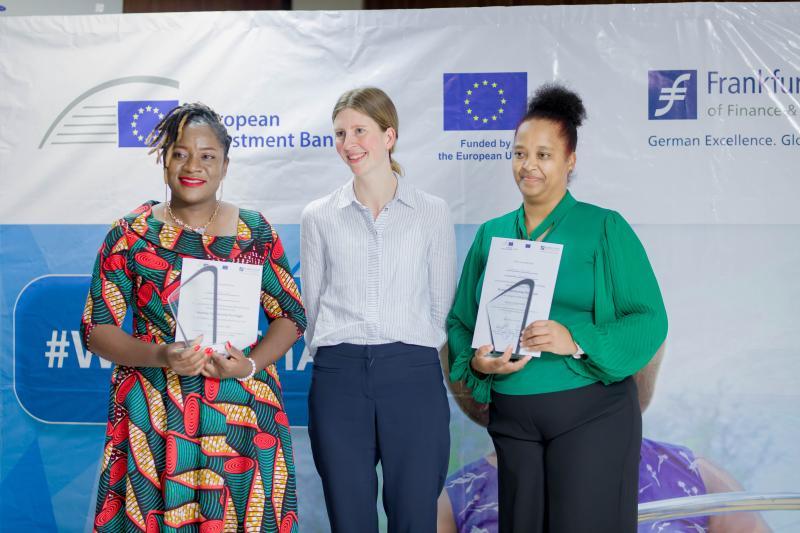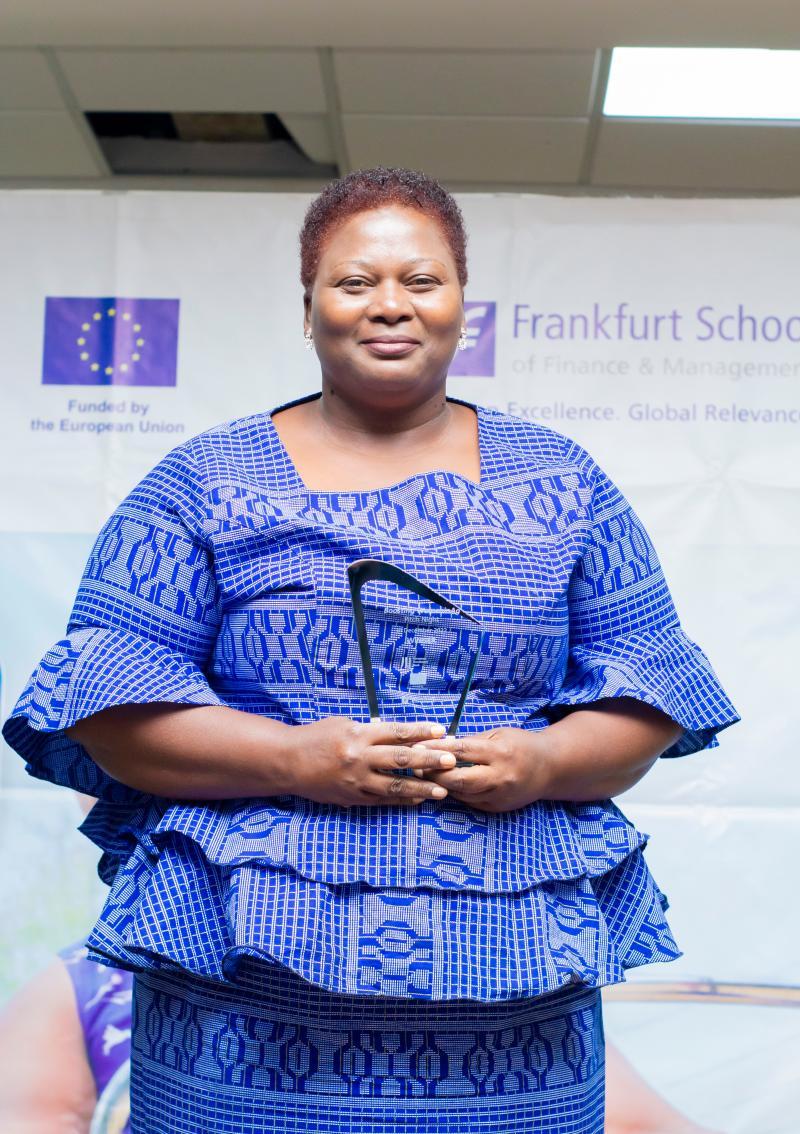Better access to finance for small and medium-sized agriculture business in Malawi, especially those run by women
Boosting women agri-businesses in Malawi
Joyce Banda set up WiJays in 2017, an agribusiness producing detergents and soaps using raw materials grown by local women farmers in Malawi. Her company, which applies a circular economy approach throughout its production chain and partners with distributers and supermarkets, was the winner of the jury vote at a ‘pitch night’ in the Northern City of Mzuzu organised in June 2023.
“It was a wonderful journey for me. The training and the preparation helped me a lot to change several things in my business system, like how to better manage information, finance, and marketing. I benefited from networking and made many useful contacts,” she says.
Banda also made a significant new contact at the event: her new bank, First Capital Bank Malawi, which helped her to solve her need for foreign exchange to invest in new machinery and expand her factory.
Pitch nights like these are part of The Kulima Access to Finance Project, a joint initiative launched by the European Investment Bank and the European Commission under the Africa Investment Platform to improve access to finance for small and medium-sized agriculture business in Malawi, especially those run by women. In total, 45 women were trained over three pitch nights.

Joyce Banda, Moa Westman, Cheryl Karim (copyright EIB)
Banda was just one of 15 businesswomen to receive training at the four-day bootcamp where selected female entrepreneurs were trained on how to pitch their businesses to investors and followed a series of sessions focused on climate enterprising, business and financial modelling. Five of them competed in the Mzuzu ‘Boosting WomeninAg’ pitch night. All participants benefited from peer-to-peer learning sessions where they could get feedback and share experience.
“The Boosting WomeninAg pitch was very useful to us,” Steve Harawa, Senior Trade Finance Manager at First Capital Bank Malawi. “It was an opportunity for the bank to come face to face with women who are doing something very tangible on the ground. All participants won in my opinion. The projects they were pushing are very significant. It has been an eye opener that a lot of women are doing great things, and we looked to reach out to as many as possible.”
Ellen Gunda won both the audience and jury vote at another Boosting WomeninAg pitch night that took place the year before in Blantyre, Southern Malawi. Gunda set up Fortune Gardens Investment in 2012, a company producing confectionary groundnuts and unshelled groundnuts sold to financial intermediaries in Malawi and Zimbabwe. Fortune Gardens Investment employs seven full staff members, over 100 temporary workers and works with more than 9 000 smallholder farmers to be able to meet the market demand. The company is also producing two varieties of beans and is planning to start manufacturing peanut butter.

Ellen Gunda (copyright EIB)
“At the bootcamp, I learnt how to pitch my organisation before investors confidently in just a few minutes. I also received training on financial management and on how to work on a business plan and present it,” says Gunda.
“The pitch night changed a lot of things for me,” Gunda adds. “It was watched all over Malawi. So, my company got advertised and after that I had to manage a lot of inquiries from customers. The pitch night also made me realise that I needed to upgrade my financial system for investors.”
Gunda is still in touch with the coaches and banks she met at the pitch night and is now discussing a loan with Ecobank Malawi.
George Phuza, Head of Commercial Banking at Ecobank Malawi, confirms: “The Boosting WomeninAg pitch has been highly valuable to Ecobank Malawi. It helped us to understand the needs of women entrepreneurs and to adjust our financial solutions. We stayed in touch with contestants and winners from the Pitch Night and are supporting some of them.”
Closing the gender gap
Agriculture provides 70% of the jobs and 30% of the Gross Domestic Product of Malawi. Most of these jobs are mainly part of the informal economy and many are occupied by women.
By reinvesting up to 90% of their earnings back into their households - on nutrition, food, healthcare, school - and into their businesses, women help to reduce poverty and contribute to food security.
However, most women in agri-businesses face unequal access to land, jobs, knowledge, fertilizer, and the best seeds. With few assets, it is harder for them to increase productivity and get loans.
Markus Schulte, Investment Officer at the European Investment Bank, met with financial institutions and the Delegation of the European Union in Malawi to explore ways to help smallholders in the agriculture sector get loans and training.
“The banks we talked to explained that they were facing a lack of long-term financing limiting their capacity to offer loans for long-term investments. These banks were also reluctant to finance women agri-businesses because of their lack of collaterals and the high financial risk faced by the sector, notably due to the climate and weather uncertainty. That’s how we started developing a risk-sharing facility to encourage local banks to provide loans to clients, and in particular women, in this sector,” Schulte says.
When Moa Westman, Gender Specialist at the European Investment Bank, heard that the Bank was considering setting up the Kulima Access to Finance Project, she did not hesitate.
“When I saw this project for the first time, I was convinced that this would be a good opportunity for the EIB to make a difference, because I know what the gender gap in the agriculture sector is in Malawi,” says Westman.
Before joining the EIB, she contributed to a study that quantified the cost of the gender gap in agricultural productivity in Malawi, Tanzania, and Uganda.
The study reveals that closing the gender gap in Malawi’s agriculture sector would boost crop production by 7.3%, add USD 100 million to the economy each year and lift 240 000 people out of poverty.
“We designed the technical assistance to both increase the ability of the banks to lend to women in agriculture and to accompany these women to grow their businesses. It’s a real combination of loans and technical assistance in the form of training, coaching to pitch businesses and networking,” explains Westman. Under Kulima, the EIB provided €25 million in credit lines equally split between First Capital Bank Malawi and Ecobank Malawi, guaranteed by a grant from the European Union. These credit lines were qualified by the 2X Challenge, which provides a global standard for gender finance.
“Before partnership with the EIB, we were not focusing on businesses run by women. Our cooperation opened our eyes. Lending to women is more profitable because chances are high that they will be able to service the loan without issue and boost the diversity of their business. Also, when we lend to women, we are assured that we are also helping the larger communities, as women making money take care of their households,” said Steve Harawa from First Capital Bank Malawi.
George Phuza adds: “Collaborating with the EIB has proven highly beneficial for Ecobank Malawi. It notably supported us in delivering impactful initiatives such as Ellevate, our dedicated financial programme aimed at empowering and supporting women-focused businesses.”
Advice for future women entrepreneurs in agriculture
What is positive about the agriculture sector, according to Banda, is that you can decide to grow your business at any time, start with production and later on choose to add value and move to agro-processing.
“A woman who wants to start her agri-business needs to take entrepreneurship seriously, connect with the right people, get entrepreneurial training and manage formally her business,” says Banda, who also received The most gender focused entrepreneur award 2023 from Leading Women of Africa, a non-profit company that runs programmes, workshops, masterclasses and events for women in Africa.
She insists on the necessity to put the system and structure in place and make sure to separate personal earnings and business resources.
“Women entrepreneurs should not delay the start of their agri-business because the market is there,” advises Ellen Gunda. “People are eating every day, so this is a profitable and sustainable business. An agri-business requires a lot of study about the value chain and technical knowledge for the food production and transformation.”
The Kulima access to finance investment is part of a €111 million programme managed by the European Commission called Kulima ‘Promoting Farming in Malawi’ developed with the government of Malawi. This larger programme aims to increase agricultural productivity and diversification in Malawi, through climate-smart agricultural technologies, and to develop agriculture value chain and rural income opportunities. The Frankfurt School of Finance and Management supported the EIB with the Technical Assistance Programme.
